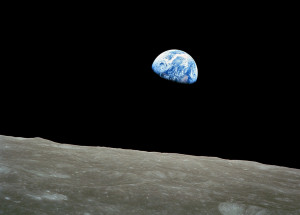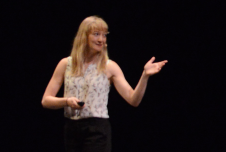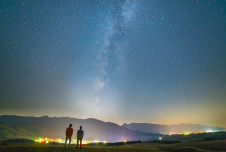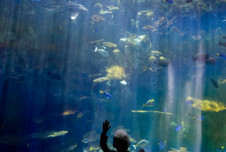Overcoming threats to humankind, like pandemics or climate change, requires a global response. Unfortunately, it can be hard to feel connected to people who are far away or very different from us—especially when we are focused on our own concerns closer to home.
 Taken by Apollo 8 crewmember Bill Anders on December 24, 1968.
© NASA
Taken by Apollo 8 crewmember Bill Anders on December 24, 1968.
© NASA
How can we build a stronger sense of our common humanity and care more about the global community? A recent study suggests that experiencing awe may help.
In a series of experiments (some with American college students, others with Americans recruited online), researchers randomly assigned some participants to write about a past awe experience or to look at photos or videos of awe-inspiring natural wonders like beautiful landscapes, wild animals, or photos of outer space.
As a comparison, other participants wrote about past experiences that made them feel pride or a recent event, or they saw photos or videos of ordinary things, such as a bus stop, a desk, or a bedroom. In one experiment, a subset of participants watched videos of natural disasters, to consider awe induced by an overwhelming negative event.
Afterward, people reported on their feelings and how strongly they identified with statements like “I feel the presence of something greater than myself” or “I feel part of some greater entity”—a measure of what researchers call a “small self,” which is a sense of feeling small in the scheme of things. Finally, the participants reported how much they felt like a citizen of the world and how strongly they agreed with statements like: I “identify with (that is, feel a part of, feel love toward, have concern for) all humans everywhere” or I “share a common destiny with other fellow human beings.”
The researchers found that people feeling awe (as opposed to other emotions) felt a “small self” more strongly, which made them identify more with being a global citizen and feel more connected to people across the world. The same held true whether awe was induced by a negative or positive event.
“Awe helps you realize that you’re a small piece of a larger universe,” says Sean Laurent of Pennsylvania State University, a coauthor of the study. “That naturally leads to a realization that people elsewhere are relevant and worthy of concern.”
To see if experiencing awe might not just increase global concern but also action to relieve global suffering, Laurent and colleagues asked people to make a donation (of any amount) to two potential charities—one that benefitted children in the U.S., another that served children around the world. They found that people induced to feel awe and a “small self” donated proportionately more money to the global charity.
“When you get people thinking in these ways—like I’m just one grain of sand among all of the other grains of sands on the beach—it actually leads to a more cosmopolitan pro-sociality, where you want to help people who are further away,” says Laurent. “It broadens your moral circle of care.”
It may also make people more curious about people who are different, according to another experiment within the study. When participants were asked about their interest in trying a “global” burger recipe (with a portobello mushroom bun, black bean patty, and mozzarella cheese) or a typical American burger recipe (with a sesame bun, beef patty, and American cheese), those experiencing awe were more open to trying the foreign recipe.
“When we feel as if we’re all connected [through awe], it can really make us a lot more tolerant and understanding of other people’s situations and have more appreciation for diversity and for diverse experiences,” says Laurent.
These findings add to past research showing that awe is a prosocial emotion that stimulates people to want to be generous and more tolerant of difference. Not only does experiencing awe affect how we treat those around us, it may expand our circle of care and willingness to engage with people in faraway places—or anyone different than us.
Laurent hopes his research might encourage more people to engage in everyday awe, whether that involves going out in nature or being inspired by pictures of the vastness of the universe. In his personal life, he encourages his kids to experience awe regularly, hoping to make them more receptive to the idea that all people are interconnected—something he believes we all could use more of.
“Don’t just spend time in nature or look up at the stars, but take the time to marvel at how amazing the world truly is and cultivate that sense of wonder in yourself,” he says. “If we all had a good dose of awe, maybe we’d be a little bit more empathic and understanding of differences that exist in the world.”









Comments